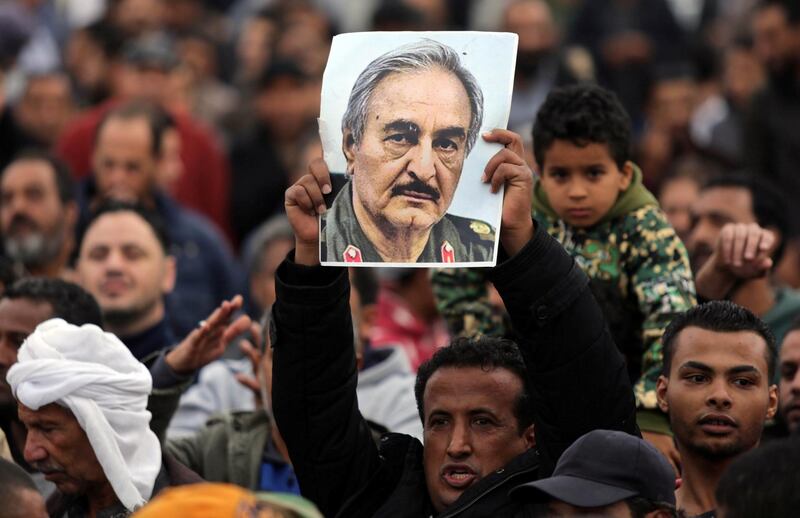Veteran military commander Khalifa Haftar, the most powerful figure in eastern Libya, returned to Benghazi on Thursday after a two-week absence during which he received medical treatment in Paris.
Mr Haftar, 75, smiled and joked as he greeted a delegation of senior officials after stepping off a late afternoon flight from Cairo, where he had been having talks with officials from Egypt, his main backer, several Libyan and Egyptian sources told Reuters.
He has long been seen as a contender for national power, and reports about his health sparked a flurry of speculation inside Libya, including claims that he was gravely ill and that rivals were manoeuvring to replace him.
“I want to reassure you that I am in good health,” he told senior army commanders and local elders in a televised address from the airport shortly afterwards.
_______________
Read more:
Editorial: In the chaos of Libya, there is a cause for renewed hope
UN concerned over recent killings in east Libyan cities
ICC warns Libya of investigations into war crimes
_______________
“I should be addressing you standing up but I am obliged to do so sitting down,” Mr Haftar quipped, seated in front of a bank of microphones on an ornate table.
Authorities in eastern Libya did not issue any pictures or detailed information about his health during his stay in Paris, fuelling speculation over his condition and the possible impact on the balance of power in Libya.
“I won’t respond to those promoting rumours about my health, and you are not responsible for them. But there are those who will answer for them in the appropriate way,” Mr Haftar said.
Libya fragmented after a 2011 uprising that ended more than four decades of dictatorship under Muammar Gaddafi and has been divided since 2014 between rival governments and military alliances based in the east and the west.
The United Nations has been leading an effort to stabilise and reunify the oil-rich nation of six million and has said it hopes to hold national elections by the end of the year.
Mr Haftar, a former commander in Gaddafi’s army who turned against him and returned to Libya to join the 2011 uprising, has gradually extended his grip on Libya’s east and parts of the south, taking full control of Benghazi last year after a three-year military campaign.
His Libyan National Army (LNA) is aligned with a parliament and a largely powerless government that has been based in eastern Libya since 2014.
With support from president Abdel Fattah al-Sisi’s Egypt and the United Arab Emirates, he has promised to drive out Islamist militants and “liberate” Tripoli, bringing the capital’s militias to heel.
He has opposed a UN-backed transitional government that has been trying to establish itself from Tripoli for the past two years.
Since 2016 Mr Haftar has also controlled all the oil ports and main fields in the east, where most of Libya’s oil resources are concentrated.
But he has remained a divisive figure, viewed by opponents as an old-fashioned military strongman who seeks to reimpose authoritarian rule across Libya and labels all his rivals as terrorists.





